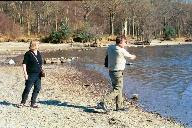This time of year in the Republic of Cyprus (South) was always festive, if sometimes in unfamiliar and slightly disturbing ways. From December 24 or 25 until January 6 it seemed nothing but celebration, with New Year’s thrown in as a secular bonus. In the public arena at least January 6 - Epiphany - seemed at least as important as Christmas, possibly more so. The baptism of Jesus always meant solemn parades from church to waterfront with the Church more than militant. Episcopal robes and banners supported by the military bearing automatic weapons. A combination of nationalism and religion that can be seen in many of the Greek Cypriot statements regarding the division of the island. Always difficult - from the first crusade to the war in Gaza - when the political argument for a boundary relies on deus vult - God wills it. [Predictive text less than helpful - tried to render deus vult as dues vultures].
A festive season that is not quite over - not here where celebration is linked to quite other feasts, but in parts of the Orthodox world where today is Christmas. Had always wondered why Greece and Cyprus celebrated Christmas on December 25, as in Saskatchewan my Ukrainian Orthodox students observed it on January 7. The short version of the explanation (and mindful that in Orthodoxy schism is possible over the question of how many fingers should be used in making the sign of the cross) is that the Julian calendar was followed by all Christians initially but over time got increasingly out of sync with the solar year. When Pope Gregory approved a more accurate calendar in the 16th century Catholics and later Protestants switched to it but the Orthodox continued to use the Julian calendar for religious purposes, leading to them celebrating December 25 on what the rest of the world acknowledged to be January 7. Enter an inter-Orthodox gathering in 1923 which adopted a revised Julian calendar, essentially the same as the Gregorian one. The Greek Orthodox Church and most of its member Churches accepted it but the Russian Orthodox and a number of others did not. Enter Ukraine, which has traditionally, like my Saskatchewan students, celebrated on January 7 but now has moved - well not all of them - to December 25, a date not shared with Russia.
And our Christmas decorations? Should be able to get round to taking them down whenever and be in harmony with someone.





